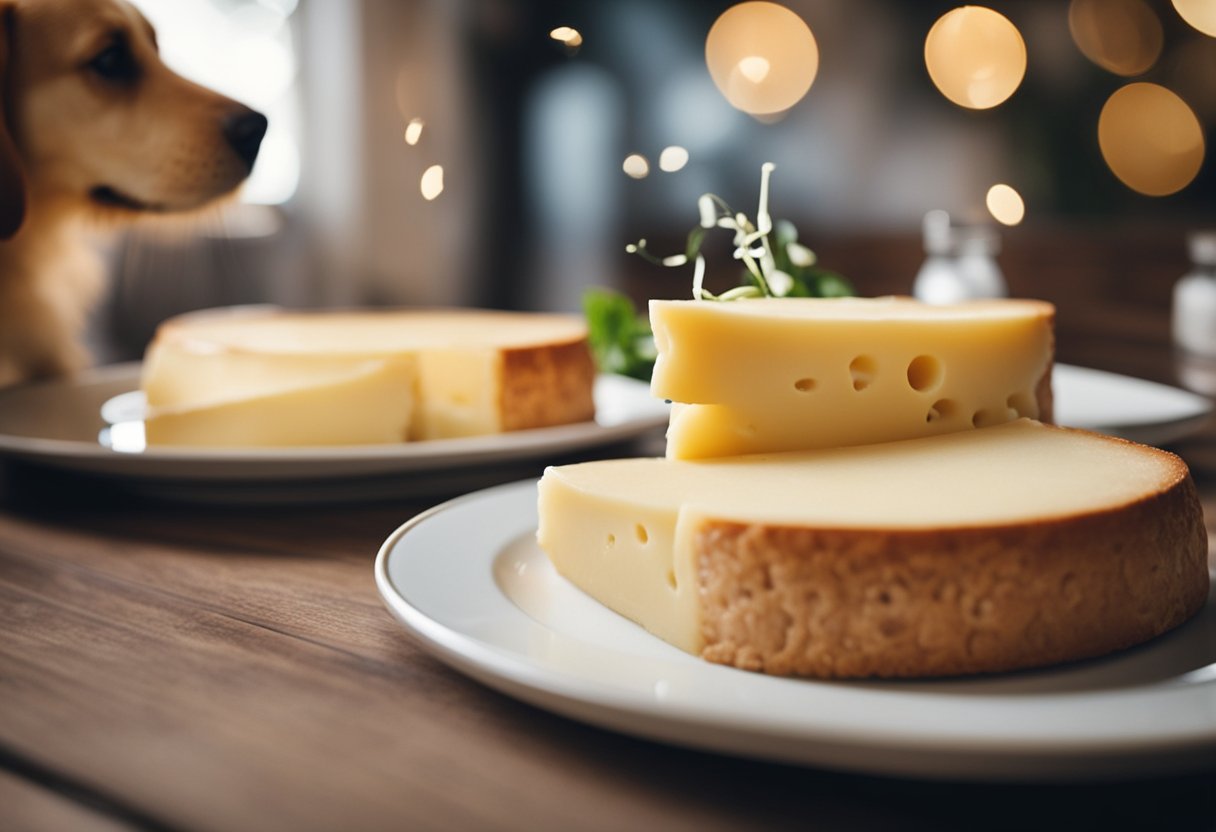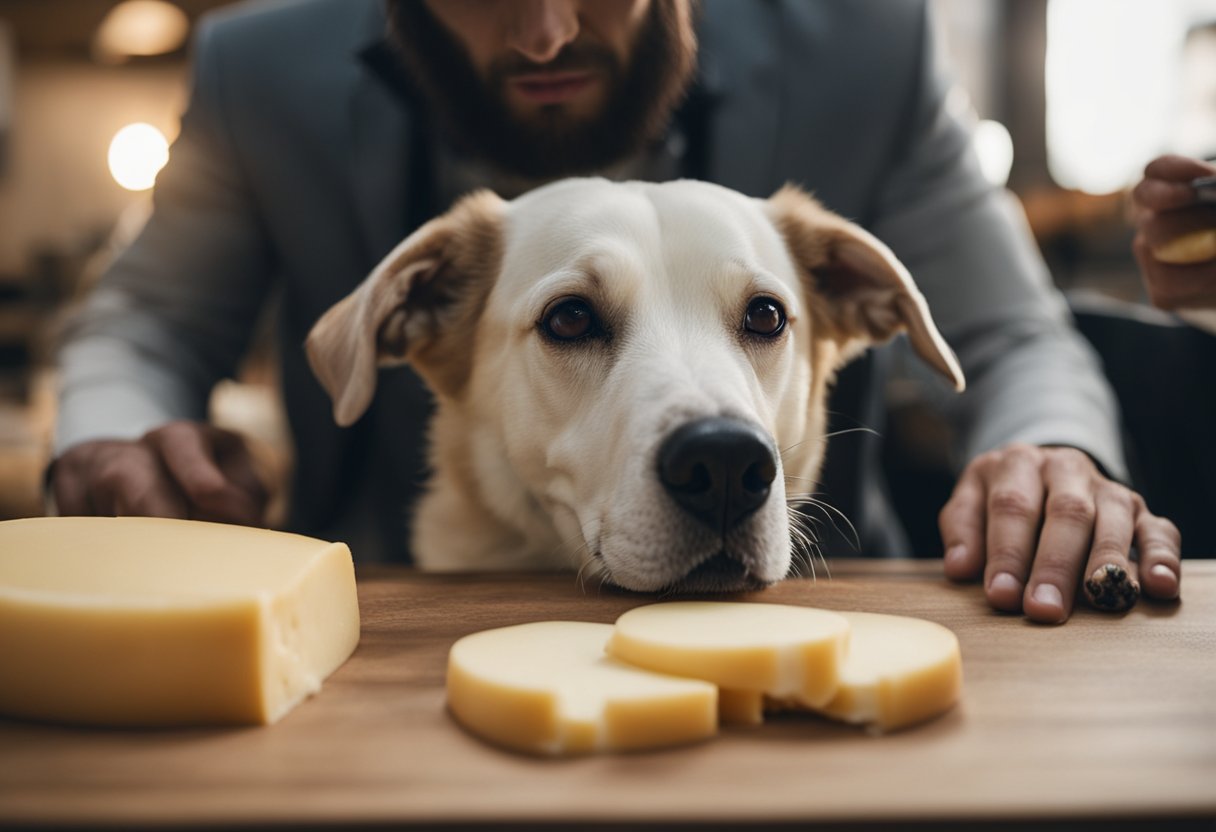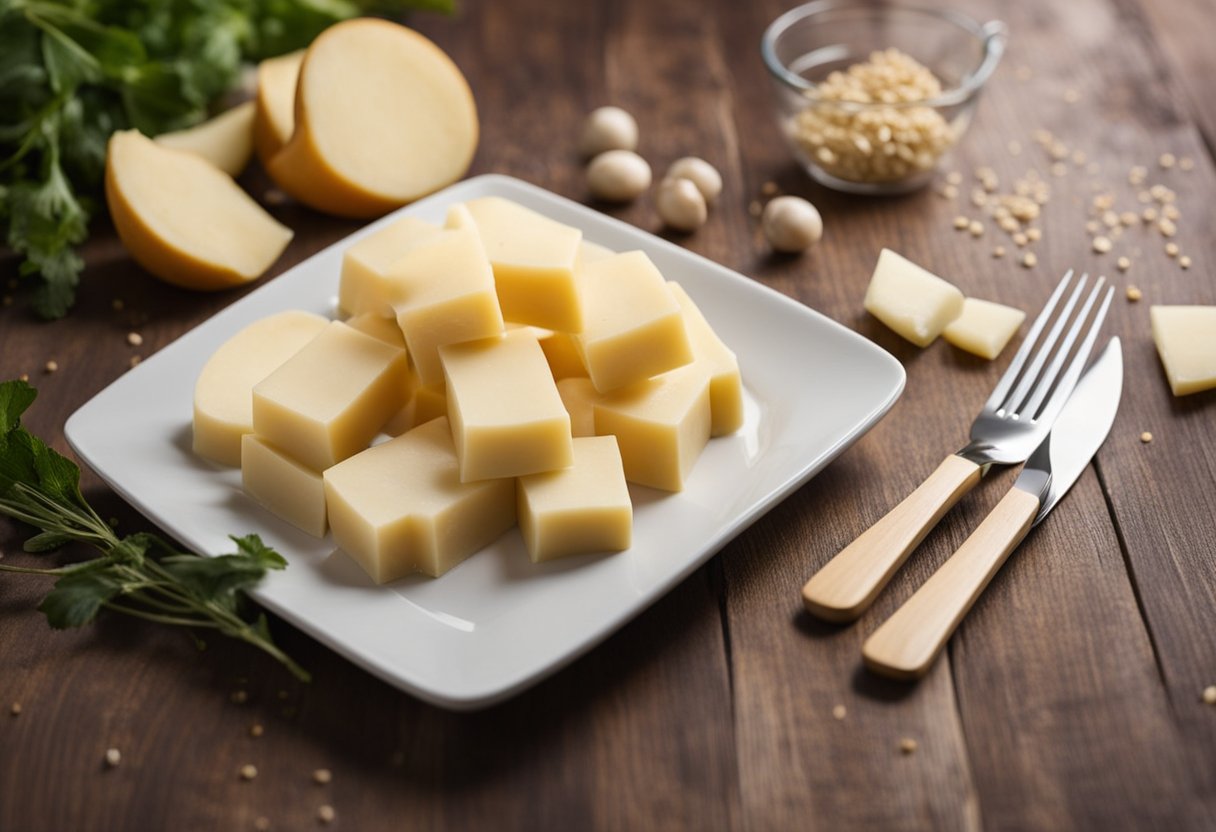As a dog owner, it’s important to know which human foods are safe for your furry friend to consume. One of the most common questions I get asked is whether or not dogs can eat provolone cheese. Provolone is a popular cheese that is often used in sandwiches and pizzas, and it’s understandable why some pet owners might want to share a bite with their canine companion.

However, the answer to whether or not dogs can eat provolone cheese is not straightforward. While cheese is generally not toxic to dogs, certain types of cheese, including provolone, can cause digestive issues and other health problems. Provolone is a high-fat cheese that can lead to obesity and pancreatitis in dogs if consumed in large quantities. Additionally, some dogs may be lactose intolerant, which can cause diarrhea, vomiting, and other gastrointestinal problems.
So, can dogs eat provolone cheese? The answer is that it’s best to avoid feeding your dog provolone, or any other type of cheese, as a regular part of their diet. While a small amount of cheese as a treat is not likely to cause harm, it’s important to remember that dogs have different nutritional needs than humans, and feeding them a diet that is high in fat and calories can lead to serious health problems down the line. If you’re looking for a safe and healthy treat for your furry friend, there are plenty of dog-friendly options available, such as carrots, apples, and lean meats.
Understanding Provolone

Provolone is a semi-hard Italian cheese that originated in southern Italy. It is made from cow’s milk and has a pale yellow color with a smooth texture. Provolone has a mild and slightly sweet flavor that is often compared to mozzarella, but with a firmer texture and a more complex taste.
Provolone cheese is widely used in Italian cuisine, especially in sandwiches, pizzas, and pasta dishes. It is also a popular cheese for snacking and is often served with crackers or fruit.
When it comes to dogs, provolone cheese is not toxic or harmful to them in small amounts. However, it is important to note that cheese, in general, is high in fat and calories, which can lead to obesity and other health problems if consumed in excess.
As a responsible dog owner, it is essential to monitor your pet’s diet and ensure that they are getting a balanced and nutritious diet that meets their specific needs.
In summary, provolone cheese is a delicious and versatile Italian cheese that is safe for dogs to eat in moderation. However, it is important to keep in mind that cheese is not a necessary part of a dog’s diet and should be given as an occasional treat.
Nutritional Content of Provolone

As a dog owner, it is important to know what your furry friend is consuming. Provolone cheese is a popular cheese variety that many humans enjoy, but can dogs eat provolone? Before we answer that question, let’s take a look at the nutritional content of provolone cheese.
Provolone cheese is a good source of protein, which is essential for your dog’s growth and repair of body tissues. However, it is also high in fat, which can lead to obesity and other health problems if consumed in excess. Therefore, it is important to feed provolone cheese to your dog in moderation.
Provolone cheese is also a good source of calcium, which is important for strong bones and teeth. It also contains small amounts of vitamins, including vitamin A and B-complex vitamins. However, it is important to note that provolone cheese is not a significant source of vitamins and should not be relied upon as a primary source of nutrition for your dog.
In terms of calories, provolone cheese is relatively high, with approximately 98 calories per ounce. This means that feeding your dog too much provolone cheese can lead to weight gain and other health problems.
Provolone cheese does not contain any significant amounts of sugars or essential fatty acids. It also does not contain any significant amounts of minerals other than calcium.
In conclusion, while provolone cheese can be a tasty treat for your dog, it should be fed in moderation due to its high fat and calorie content. It is important to ensure that your dog is receiving a balanced and nutritious diet that meets all of their nutritional needs.
Dogs and Dairy
https://www.youtube.com/watch?v=MwkV4spo-EQ&embed=true
As a dog owner, you may wonder if it is safe to feed your furry friend provolone cheese. While cheese is not toxic to dogs, it is important to keep in mind that dogs have different digestive systems than humans.
Dogs do not digest dairy products as easily as humans do because they lack the necessary enzyme, lactase, to break down lactose, the sugar found in milk. As a result, feeding your dog dairy products can lead to digestive upset, gas, and diarrhea.
While provolone cheese is not the most lactose-heavy cheese, it still contains lactose. Therefore, it is recommended that you avoid feeding your dog provolone cheese or any other dairy product unless you know that your dog can tolerate lactose.
If your dog is lactose intolerant, there are lactose-free dog food options available on the market. These dog foods are formulated to provide the necessary nutrients without causing digestive upset.
In conclusion, while provolone cheese is not toxic to dogs, it is not recommended to feed it to them due to their difficulty in digesting lactose. If you want to treat your furry friend to a cheesy snack, it is best to stick to dog-friendly cheese options or lactose-free dog food.
Potential Risks of Feeding Provolone to Dogs
https://www.youtube.com/watch?v=WIcjD7-nTgI&embed=true
As a dog owner, you may be tempted to share your food with your furry friend, including cheese like provolone. However, it’s important to be aware of the potential risks associated with feeding provolone to dogs.
First and foremost, provolone is not a natural part of a dog’s diet, and feeding it to them can upset their digestive system. Dogs may experience diarrhea and vomiting after consuming provolone, which can lead to dehydration and other health complications.
In addition, provolone is a high-fat food that can contribute to pancreatitis in dogs. This is a condition where the pancreas becomes inflamed, which can cause abdominal pain, vomiting, and lethargy. Pancreatitis can be a serious and potentially life-threatening condition, so it’s important to be mindful of the types and amounts of food you feed your dog.
Feeding your dog too much provolone can also contribute to weight gain and obesity. Dogs that are overweight or obese are at a higher risk for a range of health problems, including joint pain, heart disease, and diabetes.
If you suspect that your dog has consumed provolone or any other food that may be harmful to them, it’s important to contact your veterinarian right away. They can provide guidance on how to manage any symptoms and prevent further complications.
In summary, while it may be tempting to share your food with your furry friend, it’s important to be aware of the potential risks associated with feeding provolone to dogs. Stick to a balanced, nutritious diet that is specifically formulated for your dog’s needs, and consult with your veterinarian if you have any concerns about their health or diet.
Provolone Vs Other Cheeses
When it comes to feeding our furry friends, it’s important to know which foods are safe and which ones are not. Cheese is a popular treat for dogs, but not all cheeses are created equal. In this section, I will compare provolone cheese to other types of cheese and provide information on which cheeses are safe for dogs to eat.
Provolone Cheese
Provolone cheese is a semi-hard cheese that originated in Italy. It has a mild, slightly tangy flavor and a smooth texture. Provolone cheese is commonly used in sandwiches and as a topping for pizza. While some dogs may enjoy the taste of provolone cheese, it is not recommended to feed it to them regularly.
Cheddar Cheese
Cheddar cheese is a popular cheese that originated in England. It has a sharp, tangy flavor and a crumbly texture. Cheddar cheese is commonly used in sandwiches and as a topping for burgers. While cheddar cheese is safe for dogs to eat in small amounts, it is high in fat and calories, so it should be given sparingly.
Swiss Cheese
Swiss cheese is a mild, nutty cheese that originated in Switzerland. It has a firm texture and is commonly used in sandwiches and as a topping for burgers. While Swiss cheese is safe for dogs to eat in small amounts, it is high in fat and calories, so it should be given sparingly.
Mozzarella Cheese
Mozzarella cheese is a soft, mild cheese that originated in Italy. It has a smooth texture and is commonly used as a topping for pizza. While mozzarella cheese is safe for dogs to eat in small amounts, it is high in fat and calories, so it should be given sparingly.
Parmesan Cheese
Parmesan cheese is a hard, salty cheese that originated in Italy. It has a strong, nutty flavor and is commonly used as a topping for pasta dishes. While parmesan cheese is safe for dogs to eat in small amounts, it is high in fat and calories, so it should be given sparingly.
Gouda Cheese
Gouda cheese is a semi-hard cheese that originated in the Netherlands. It has a nutty, buttery flavor and a smooth texture. Gouda cheese is commonly used in sandwiches and as a topping for burgers. While gouda cheese is safe for dogs to eat in small amounts, it is high in fat and calories, so it should be given sparingly.
Blue Cheese
Blue cheese is a soft, creamy cheese that is known for its pungent flavor and blue veins. It is commonly used as a dressing for salads and as a topping for burgers. While blue cheese is safe for dogs to eat in small amounts, it is high in fat and calories, so it should be given sparingly.
Cottage Cheese
Cottage cheese is a soft, crumbly cheese that is low in fat and calories. It is commonly used as a topping for salads and as a snack. Cottage cheese is safe for dogs to eat in small amounts and can be a good source of protein for them.
Ricotta Cheese
Ricotta cheese is a soft, creamy cheese that is low in fat and calories. It is commonly used in Italian dishes such as lasagna and cannoli. Ricotta cheese is safe for dogs to eat in small amounts and can be a good source of protein for them.
Low-Fat Provolone Cheese
Low-fat provolone cheese is a healthier alternative to regular provolone cheese. It has a lower fat content and fewer calories, making it a better choice for dogs. While low-fat provolone cheese is safe for dogs to eat in small amounts, it should still be given sparingly.
In conclusion, while some cheeses are safe for dogs to eat in small amounts, it’s important to remember that cheese is high in fat and calories and should be given sparingly. Provolone cheese is not recommended for dogs, but there are many other types of cheese that can be a safe and healthy treat for them.
Feeding Guidelines for Dogs
https://www.youtube.com/watch?v=2B79LyRka_A&embed=true
As a dog parent, it’s important to ensure that your furry friend is getting a balanced and healthy diet. While dogs can eat many types of human foods, it’s important to understand what foods are safe for them and in what moderation.
When it comes to feeding dogs provolone cheese, it’s important to note that cheese is high in fat and calories, which can lead to obesity and other health issues in dogs if consumed in excess. Therefore, feeding provolone cheese to your dog should be done in moderation.
It’s also important to note that not all dogs can tolerate dairy products, as some may be lactose intolerant. If your dog shows any signs of gastrointestinal upset, such as diarrhea or vomiting, after consuming provolone cheese, it’s best to avoid feeding it to them in the future.
Puppies, in particular, should not be fed provolone cheese or any other human foods until they are at least 8 weeks old and have been weaned off their mother’s milk. Their digestive systems are still developing, and they require a specific balance of nutrients to support their growth and development.
In general, it’s best to stick to a balanced diet of high-quality dog food that meets your dog’s nutritional needs. If you do choose to feed your dog human foods, including provolone cheese, it should be done in moderation and as a treat rather than a regular part of their diet.
In conclusion, while provolone cheese can be safe for dogs in moderation, it’s important to be mindful of the potential risks and to prioritize a balanced and healthy diet for your furry friend.
Alternative Foods for Dogs
As a dog owner, I always want to make sure that my furry friend is getting the best nutrition possible. While it can be tempting to share human food with our dogs, it’s important to remember that not all human foods are safe for dogs to eat. In fact, some human foods can be toxic to dogs. One such food is provolone cheese.
Provolone cheese is high in fat, which can lead to obesity and other health problems in dogs. Additionally, it contains lactose, which many dogs are unable to digest properly. This can lead to digestive issues such as diarrhea and vomiting.
Fortunately, there are plenty of alternative foods that dogs can eat that are both safe and healthy. Here are a few options:
-
Low-fat cheese: If you want to give your dog cheese, opt for low-fat varieties such as cottage cheese or mozzarella. These cheeses are lower in fat and lactose than provolone, making them a healthier option for dogs.
-
Whole milk yogurt: Yogurt is a great source of probiotics, which can help improve your dog’s digestive health. However, make sure to choose plain, whole milk yogurt without any added sugars or artificial sweeteners.
-
Fatty acids: Omega-3 and Omega-6 fatty acids are essential for your dog’s overall health. You can find these fatty acids in foods such as fish, flaxseed, and chia seeds. Alternatively, you can give your dog a fatty acid supplement to ensure they are getting enough of these important nutrients.
It’s important to remember that while these foods are safe for dogs to eat, they should still be given in moderation. Too much of any food, even a healthy one, can lead to weight gain and other health problems. As always, consult with your veterinarian before making any changes to your dog’s diet.
Conclusion
After conducting research and analyzing the available information, I have come to the conclusion that dogs should not eat provolone cheese. While provolone cheese is not toxic to dogs, it is high in fat and sodium, which can cause digestive issues and other health problems.
Feeding your dog provolone cheese can lead to obesity, pancreatitis, and other health issues. Additionally, some dogs may be lactose intolerant, which can cause gastrointestinal upset and diarrhea.
It is important to note that while provolone cheese is not toxic to dogs, it is not a necessary part of their diet. There are many other healthy and safe treats that you can give your dog instead of cheese.
In summary, while it may be tempting to share your provolone cheese with your furry friend, it is best to avoid doing so. Instead, opt for healthy and safe treats that are specifically designed for dogs.






